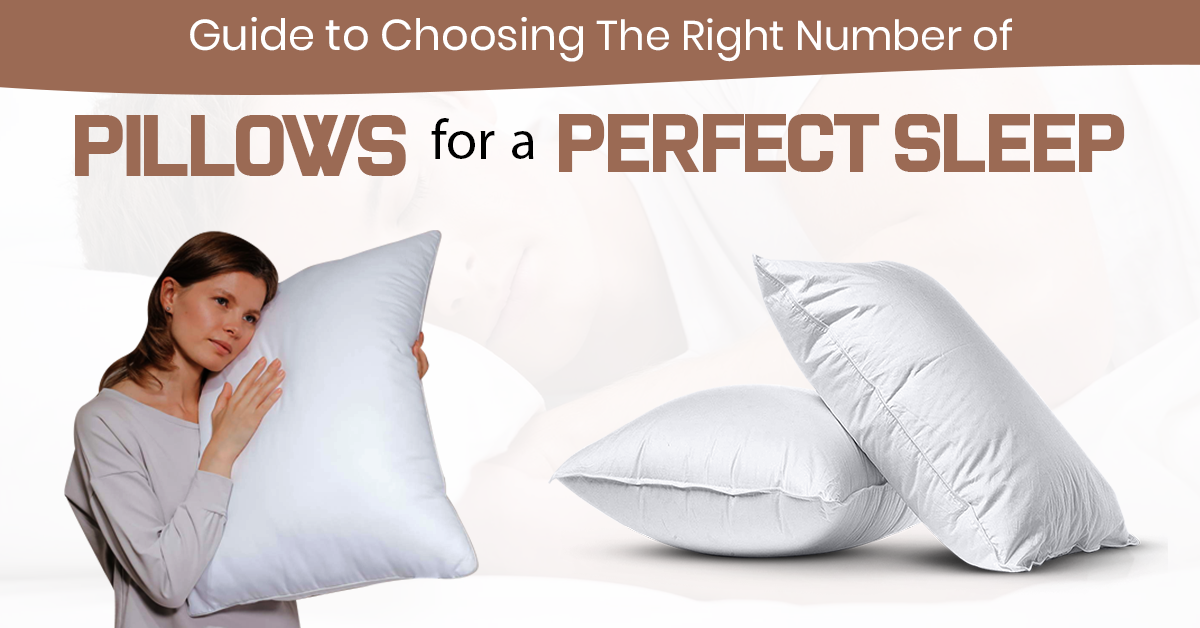Hello, sleep enthusiasts! If you've ever found yourself tossing and turning at night, waking up with a stiff neck, or simply not feeling rested, the culprit might be right under your head. Yes, I'm talking about pillows. Choosing the right number of pillows can significantly impact the quality of your sleep, and that's what we'll be diving into today. We'll explore the importance of pillow selection, the requirements for different sleeping positions, health considerations, and even how age affects your pillow needs. By the end of this guide, you'll clearly understand how to optimise your pillow setup for the perfect night's sleep. So, let's get started!
Importance of Pillow Selection for Sleep Quality
Pillows are more than just a comfy place to rest your head. They play a critical role in ensuring quality sleep by providing the necessary support and comfort. Here's why selecting the right pillow is crucial:
Support and Comfort
The primary function of a pillow is to support your head and neck while you sleep. The right pillow keeps your upper body in alignment during sleep, relieving pressure and balancing the points in your body. This balance is key to staying comfortable and avoiding pain.
Spinal Alignment
Your spine should maintain its natural curve while you sleep. A bounce back pillow that is too high or too low can disrupt this alignment, leading to discomfort and potential long-term health issues. Proper spinal alignment helps prevent neck and back pain, and a well-chosen pillow ensures your spine remains neutral.
Pressure Relief
Different sleeping positions exert pressure on different parts of the body. A good pillow helps alleviate this pressure by distributing your weight evenly and providing the necessary cushioning. This relief is crucial for avoiding aches and pains, particularly in the neck and shoulders.
Sleeping Positions and Pillow Requirements
Your preferred sleeping position significantly influences the type and number of needed pillows. Let's break it down:
Back Sleepers

Back sleepers typically require a thinner pillow that supports the neck's natural curve without pushing the head too far forward. A pillow with medium firmness is often ideal, providing enough support without being too hard. You might also consider a contoured pillow designed specifically for back sleepers, which offers additional neck support.
Side Sleepers

Side sleepers need a thicker, firmer pillow to fill the space between the ear and the shoulder, ensuring the neck stays aligned with the spine. A pillow that is too thin will cause the head to tilt downward, while one that is too thick will push it upward, leading to potential discomfort. A good side sleeper pillow should maintain the alignment of the neck and provide enough cushioning to prevent shoulder pain.
Stomach Sleepers

Stomach sleepers generally benefit from a very thin pillow or no pillow. This position can strain the neck and lower back, so minimising elevation helps reduce the risk of misalignment. Some stomach sleepers even prefer to place a pillow under their stomach and hips to help maintain a more natural spinal position.
Health Considerations
Selecting the right pillow is also essential for addressing specific health concerns. Here are some key considerations:
Neck Pain and Cervical Support
If you suffer from neck pain, a pillow designed for cervical support can be a game-changer. These pillows are contoured to support the natural curve of your neck, reducing strain and promoting proper alignment. Memory foam or latex pillows are often recommended for their ability to conform to the shape of your head and neck, providing customised support.
Allergies and Hypoallergenic Options
Allergies can severely disrupt your sleep, making it essential to choose hypoallergenic pillows. These pillows are made from materials that resist common allergens like dust mites, mould, and pet dander. Synthetic fills, such as polyester, or natural fills, like latex and wool, are excellent hypoallergenic options.
Sleep Apnea and Pillow Elevation
For individuals with sleep apnea, the right pillow can help improve breathing during sleep. Elevating the head slightly can prevent the airway from collapsing, reducing the frequency of apnea episodes. Wedge pillows are particularly effective, providing a gentle incline that supports the head and neck. Some sleep apnea patients also benefit from specialised pillows that accommodate CPAP masks.
Age and Pillow Needs
As we age, our pillow requirements can change. Here's a look at how different age groups can benefit from tailored pillow choices:
Children
Children need smaller, softer pillows that support their growing bodies without pushing their heads too far forward. A good rule of thumb is introducing a pillow when a child transitions from a crib to a bed, around 18-24 months. The pillow should be firm enough to provide support but soft enough to be comfortable.
Adults
Adults have the widest range of pillow needs, depending on their sleeping position, health issues, and personal preferences. It's important for adults to regularly reassess their pillow choices, as factors like weight, posture, and health conditions can change over time.
Seniors
Seniors often experience more issues with pain and discomfort, making the right pillow even more critical. A supportive, ergonomic pillow can help alleviate common problems like neck pain, arthritis, and acid reflux. Memory foam or adjustable pillows can offer the adaptability to meet these changing needs.
Number of Pillows: Pros and Cons
Now, let's explore the pros and cons of different pillow setups:
Sleeping with No Pillows
Pros:
- It may benefit stomach sleepers by reducing neck strain.
- It can promote a more natural alignment for some people.
Cons:
- Lacks support for the head and neck, potentially causing discomfort.
- It is unsuitable for back and side sleepers needing elevation for proper spinal alignment.
Sleeping with One Pillow
Pros:
- Provides basic support for most sleeping positions.
- Easy to manage and maintain.
Cons:
- It may not provide adequate elevation for back and side sleepers.
- Limited flexibility for adjusting comfort levels.
Sleeping with Two Pillows
Pros:
- Offers more customisation for different sleeping positions.
- It can provide additional support for the back and neck.
Cons:
- It may cause neck strain if not positioned correctly.
- It can be cumbersome and lead to clutter on the bed.
Sleeping with Multiple Pillows
Pros:
- Maximum customisation for support and comfort.
- Allows for specific positioning, such as elevating legs or providing lumbar support.
Cons:
- It can be cumbersome and take up too much space.
- It may lead to improper alignment if not used correctly.
Pregnancy and Pillow Use
Pregnancy often requires additional support to ensure comfort and proper alignment. Specialised pregnancy pillows, such as body or U-shaped, can support the back, belly, and knees, helping reduce pain and improve sleep quality.
Conclusion
Choosing the right number of pillows is a highly personal decision that depends on various factors, including your sleeping position, health concerns, and personal comfort preferences. By understanding the importance of support, spinal alignment, and pressure relief, you can make an informed choice that enhances your sleep quality. Remember, the right pillow setup can make a difference in how rested and refreshed you feel each morning.
FAQs
How often should I replace my pillow?
It's generally recommended that you replace your pillow every 1-2 years. Over time, pillows lose shape and support and accumulate allergens like dust mites. Regular replacement ensures that you continue receiving the support you need for a good night's sleep.
What is the best pillow for neck pain?
The best pillow for neck pain maintains the natural curve of your neck while providing adequate support. Memory foam or cervical pillows are often recommended, as they conform to the shape of your head and neck, providing personalised support.
Can the wrong pillow cause health issues?
Yes, the wrong pillow can lead to various health issues, including neck and back pain, headaches, and poor sleep quality. A pillow that doesn't support proper spinal alignment can strain your muscles and joints, leading to discomfort and potentially chronic pain.
How do I know if my pillow is right for me?
Assessing your sleep quality and comfort can tell you if your pillow is right for you. Your pillow is likely a good fit if you wake up without pain and feel well-rested. Additionally, check if your pillow maintains its shape and provides consistent support throughout the night. If you experience discomfort or notice your pillow is losing shape, it might be time for a new one.


